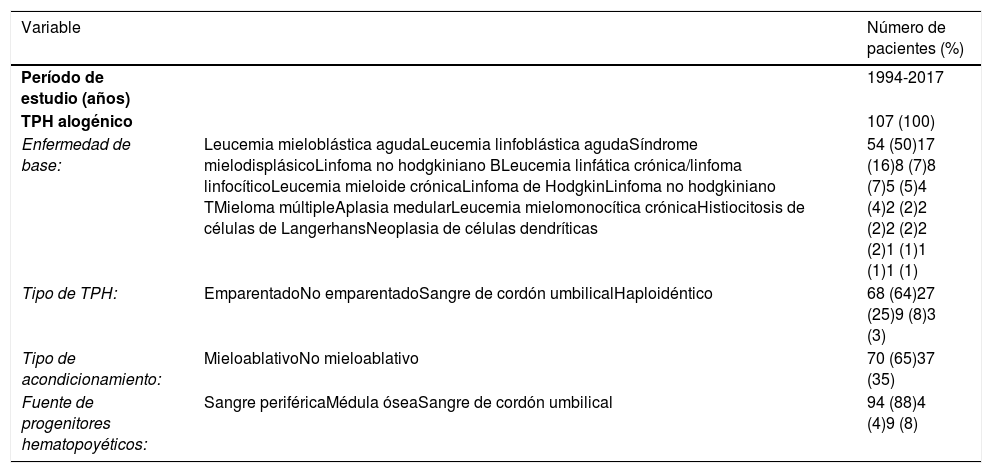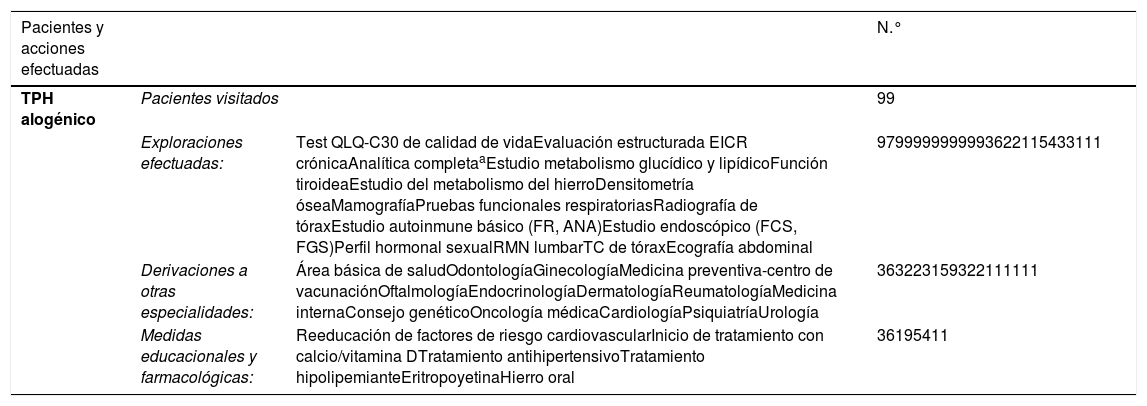Los pacientes que sobreviven más allá de 2 años del trasplante de progenitores hematopoyéticos (TPH), tienen un riesgo aumentado de complicaciones a largo plazo, que tienen impacto en su supervivencia y calidad de vida. El objetivo de este estudio fue diseñar y aplicar un protocolo de seguimiento a largo plazo para detectar necesidades no cubiertas y tratar precozmente dichas complicaciones.
Pacientes y métodoA los supervivientes más allá de 2 años del TPH alogénico (aloTPH) se aplicó una sistemática de estudio para detectar y tratar complicaciones y problemas a largo plazo dentro de una unidad funcional interdisciplinar.
ResultadosTreinta y seis (36%) de los 99 pacientes incluidos, requirieron de intervención en alguno de los factores de riesgo cardiovascular mediante educación sanitaria o administración de fármacos antihipertensivos e hipolipemiantes. Nueve (25%) de 36 pacientes requirieron aporte de calcio y vitamina D. Se detectó una baja reincorporación de las mujeres a los protocolos de detección de neoplasias ginecológicas, y una baja adherencia al seguimiento odontológico tras el aloTPH.
ConclusiónEl seguimiento de los largos supervivientes a un aloTPH en una unidad multidisciplinaria permitió detectar necesidades no cubiertas, que afectaron especialmente al riego cardiovascular, metabolismo óseo, prevención del cáncer y control odontológico.
Patients who survive beyond two years after haematopoietic stem cell transplantation (HSCT) have an increased risk of long-term complications, which impact on their survival and quality of life. The aim of this study was to design and apply a long-term follow-up protocol to detect unmet needs and treat these complications early.
Patients and methodA prospective study to detect and treat complications and long-term problems within an interdisciplinary functional unit was applied to survivors beyond 2 years of allogeneic HSCT (alloHSCT).
ResultsThirty-six (36%) of the 99 patients included, required intervention in a cardiovascular risk factor by health education or antihypertensive and lipid-lowering drugs. Nine of 36 (25%) patients required calcium and vitamin D intake. Low inclusion of women in gynaecological neoplasm detection protocols was detected, as well as a low adherence to dental follow-up after alloHSCT.
ConclusionThe follow-up of long-term survivors after alloHSCT in a multidisciplinary unit allowed unmet needs to be detected and controlled, especially in cardiovascular risk, bone metabolism, cancer prevention, and dental control.








